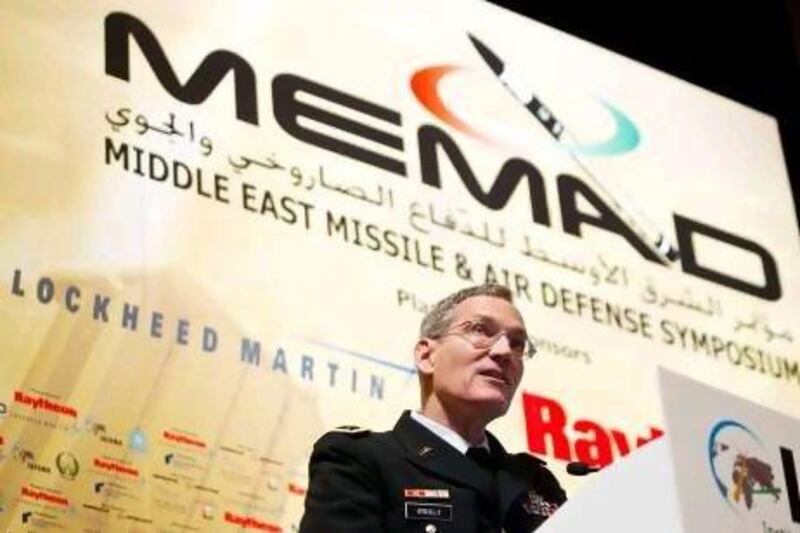ABU DHABI // GCC states must work together to develop an integrated missile defence system, according to top military commanders.
Armed forces' chiefs from the United States, France, Italy, Switzerland and the UAE agreed on the need to unite the GCC under a unified Integrated Air Missile Defence system to counter Iran's ballistic missile arsenal.
Speaking at the Middle East Missile and Air Defence Symposium in Abu Dhabi yesterday, the GCC Secretary General, Dr Abdel Latif Al Zayani, said a system had to be implemented - but this would only be possible if states work closely together.
"We want more cooperation and good relations between countries if we want to defend our land," he said.
Dr Al Zayani also stated that GCC members should not look to countries outside the region for help.
"We need to be dependent on ourselves and increase the capability of the GCC to be less dependent on our allies," he said.
The threat posed by Iran's military capabilities was at the centre of discussions at the symposium.
A retired UAE major general, Khaled Abdullah Al Bu Ainnain, the president of the Institute of Near East and Gulf Military Analysis (INEGMA), gave a presentation to delegates about Iran's current ballistic capabilities.
He said Iranian missiles could reach as far east as India, and to Greece in the west.
A US Air Force commander, Lt Gen David Goldfein, told delegates a missile defence shield was needed urgently, especially given the region's political climate.
"There is no more important time than this to discuss defence," he said. "The US has a role to play in what we offer and how we might coordinate this region for an integrated air missile defence system."
Lt Gen Goldfein said an intricate balance has to be achieved between short- and long-range missile defences.
"I recognise that every country has its own plans to defend itself, and we also have bilateral relations in the region for defence, but there are multilateral needs as well," he said.
According to Maj Gen Bu Ainnain, Iran is equipped with short- and long-range missiles.
"Missiles like the Shihab 3, which have interchangeable warheads, and the Sejil, which can carry nuclear weapons," he said.
The UAE's defensive capabilities include Terminal High Altitude Area Defence (THAAD) missiles and short-range Patriot missiles.
"With this, Bahrain, Qatar the UAE and parts of Oman and Saudi can be defended," said Maj Gen Bu Ainnain. "However, a coordinated GCC defence effort can cover the whole region."
On the sidelines of the symposium, Maj Gen Bu Ainnain said that the GCC had been working on a unified defence system for seven years. "Now these plans have to be accelerated," he added.
Maj Gen Bu Ainnain told the symposium that Iran had developed cruise missiles that could reach major cities in the Gulf, especially along the coast.
He simulated a multi-target attack on the GCC with short and long-range missiles that offered only a seven-minute response window.
"The majority of our assets are by the sea," he said. "Major cities, desalination plants and critical infrastructure make easy targets for a first attack," he warned.
The UAE is the largest arms procurer in the region, spending an estimated US$67.3 billion (Dh247bn) from 2000 to 2009, according to the Stockholm International Peace Research Institute.
Dr Theodore Karasik, director for research and development at Inegma, said the UAE's latest procurement of THAAD missiles was estimated at US$6bn.
"Whatever the UAE spends on capabilities, it is for defensive purposes because it is in a bad neighbourhood," he said. "The UAE has been involved in deployments in Libya with Nato and Afghanistan and they have made purchases to replace the equipment currently in use there."
[ amustafa@thenational.ae ]






